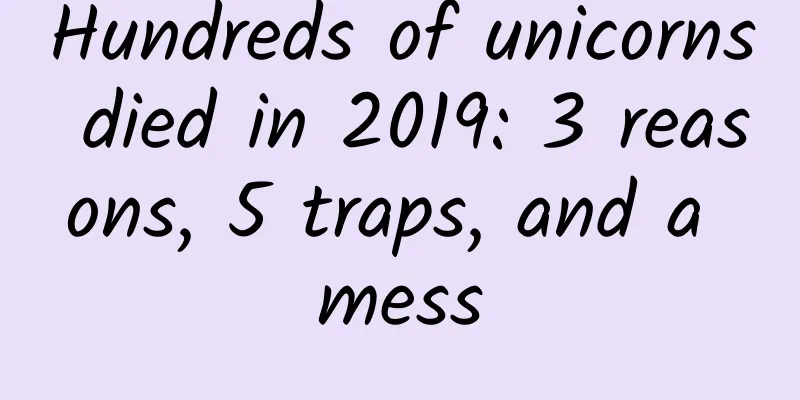Hundreds of unicorns died in 2019: 3 reasons, 5 traps, and a mess

|
2019 can be called the year of naked swimming for unicorns. This year, we saw too many once-prosperous entrepreneurial stars fall one after another, such as Tuandai.com, which was endorsed by Shi Yuzhu and valued at 10 billion yuan; Panda Live, which was backed by Wang Sicong and ranked among the top three in the live broadcast industry; and Aiwujiwu, an Internet real estate dark horse company that claimed to subvert the real estate industry... One after another, unicorn stars valued at tens of billions or even hundreds of billions of dollars have come to an end. It seems that there is nothing that cannot be brought down, only what you can't think of. The number of companies that died in 2019 is likely to far exceed that of 2018. In the "Dead Company Cemetery - New Economy Dead Company Database" released by IT Orange, 268 companies died in the first half of 2019 alone, while the number for the whole year of 2018 was 383. So, why did these unicorns turn into "poison horns" in a second? What is the common reason for their death? What is behind it that is worth our reflection? one Three major background reasons To examine this, we must first understand the broader context of 2019. First, Internet traffic has peaked, and the era of traffic dividends has ended. The latest data from QuestMobile shows that in the second quarter of 2019, China's mobile Internet users decreased by 2 million, the first negative growth in history; the growth rate of average user usage time continued to slow down, from 22.6% in the fourth quarter of 2018 to 11.8% in the first quarter of 2019, and then to 6% this quarter. Second, the downward pressure on the economy is increasing. In the first three quarters of 2019, GDP actually grew by 6.2% year-on-year, compared with 6.7% in the same period last year; among them, GDP in the third quarter actually grew by 6.0% year-on-year, compared with 6.5% in the same period last year. This is the lowest since 1991, lower than the growth rate during the global financial crisis. Looking at physical indices such as the "Keqiang Index", practical indices also show the same trend, indicating that the economic trend is more severe. The more important issue is that there is no bottoming trend at present. Under the influence of many uncertain factors such as Sino-US relations, the future climate will be even colder.
Third, the primary market is cold, falling directly back to the level of five years ago. The "2019 Mid-Year Venture Capital Report" shows that in the first half of 2019, there were 2,787 investment and financing transactions in the domestic primary market (excluding mergers and acquisitions and listings), with a total transaction amount of nearly 362.9 billion yuan, which is less than a quarter of last year. It is speculated that the number of investment and financing transactions in 2019 is likely to fall to the level before 2014, and the investment and financing transaction amount is likely to fall to the level before 2015. two Five model traps Only after understanding these three macro backgrounds can we understand why unicorns have fallen one after another. Survival is already difficult under the general environment, and changes in the environment will also lead to changes in business logic. The original business model is likely to become invalid, and the original winning formula may become a trap. In summary, we believe that, from a micro-analysis of reasons, unicorns often die from the following five model traps: (1) The “empty-handed” game is no longer viable If we talk about the industries that were hit hardest by the financial crisis this year, the top three must be P2P, long-term rental apartments, and offline education. These three industries, which seem to have nothing to do with each other, actually have a common model feature - "making money out of nothing". Hu Jinghui of I Love My Home once said: "Once the long-term rental apartment collapses, it will be more terrifying than P2P." Indeed, this year long-term rental apartments have collapsed one after another, such as Junchuang Apartment, Yueru Apartment, Yujian Apartment, Haozuhaozhu, Ai Apartment, Hangzhou Deyu... After the long-term rental apartments collapsed, not only were the tenants kicked out, but they also had to pay back the "rent loans" they owed to pay the rent. Like P2P, long-term rental apartments also play with maturity mismatch. They sign a lease for several years at a time, but pay the landlord a monthly or quarterly rent; and for the tenant, they collect a year or half a year's rent at a time. In this way, they can occupy a part of the funds that do not actually belong to them, and then build a capital pool. With this capital pool, they can use it to buy more properties or play more dangerous financial games. Offline education institutions have also experienced a series of bankruptcies, including Qiaoen English, Web English, Taisha Study Abroad, Shakespeare Children's English, Mengta Education... Industry giants have all closed down, not to mention many unknown small institutions. Poor students, who paid tens of thousands of yuan in tuition fees, not only can they not attend classes, but they also have to continue to pay back their "education loans". These institutions are also playing the game of "nine lids and ten pots". They use the advance payments from students to expand their territory. In order to attract more students, they often promise more favorable prices and bigger discounts, but this means that the more students they recruit, the more losses they suffer. In this way, if one day they cannot recruit new students and receive new advance payments, the cash flow of the institution will be broken. Why did everyone do this before, but suddenly it exploded this year? The reason lies in the overall environment. In the era when people were stupid and had a lot of money, this kind of maturity mismatch and "pass the flower" game had a steady stream of funds coming in to take over, so the flower could be passed on. But today, everyone is generally penniless, and this game of passing the flower has come to an abrupt end. (2) We can no longer afford to spend money The classic traditional way of playing the Internet is to "burn money". Alibaba, Tencent, and JD.com all rose in this way, burning money to gain market share and subsidies to gain traffic. So later entrepreneurs followed suit. Ideals are the most important, making money is not important. But in recent years, the effectiveness of this money-burning model is failing. After fierce competition, there are only a few winners, and the industry is often in a mess. The group buying field in 2011, the O2O field in 2014, the online car-hailing field in 2015, the shared bicycle field in 2017... By the way, your deposit for the small yellow car ranks 100,000 yuan? Even for those seemingly successful leading companies, their reality is not good. Uber's Q2 2019 financial report showed that its net loss reached 5.236 billion US dollars, the largest loss since the official disclosure of financial data; Lyft's loss in Q2 2019 reached 644 million US dollars, an increase of nearly 500 million compared with the same period. Didi, the largest domestic online car-hailing platform, has never made a profit since its establishment in 2012, and its losses are expanding. Its loss in 2017 was 2.5 billion yuan, and its loss in 2018 was 10.9 billion yuan, an increase of more than 4 times year-on-year. WeWork, a star of shared office space, not only suspended its IPO, but its founder and his relatives and friends were also kicked out of the company by the capital party Masayoshi Son. Why doesn’t this money-burning model work anymore? One reason is that the growth rate of Internet traffic has peaked, and your customer acquisition costs will become higher and higher. In addition, users are becoming more and more sophisticated. They have been spoiled by subsidies from various Internet companies. Now the biggest motivation for choosing a platform is to look at the subsidies. They will go to whichever platform offers the most subsidies. This has even spawned a new professional group - the "cash-back party". Second, the primary market is cold, and it is becoming increasingly difficult to fool investors. Entrepreneurs, it is useless to paint a rosy picture for me. You need to show me real money and tell me when you can make a profit. Therefore, in the past few years, it was easy for startups to get financial support and survive when they encountered operational difficulties. But now it is no longer possible. Any small problem is enough to ruin you. (3) All innovations must return to the essence of business In recent years, there is a very typical phenomenon in the Internet startup circle, that is, everyone likes to play with concepts. Nowadays, everyone likes to talk about innovation, product innovation, model innovation, technological innovation... But you must know that all innovations must return to the essence of business, otherwise it is "pseudo-innovation", so what is the essence of business? Western management masters tell us that we should serve the needs of customers. But we understand that this contains three meanings: one is sufficient customers, two is real needs, and three is that serving the needs of customers can generate positive returns. In recent years, a series of popular innovations have actually deviated from the essence of business, and therefore ushered in a cold winter after the boom. For example, the new retail "new species" that have been hyped up in recent years are now facing a life-and-death test. Yonghui’s “Super Species”, after years of serious drag on Yonghui and cumulative losses of over 1 billion in three years, was ruthlessly abandoned by Yonghui at the beginning of this year, and the Yonghui Cloud Innovation business segment, which included Super Species, was separated from the listing system; Hema Fresh also began to close stores; and the new retail format Xiaoxiang Fresh under Tuan also announced in April this year that it would close stores in Wuxi and Changzhou. Earlier, SF Express’s new retail brand SF Select also closed stores in Wuhan, Qingdao, Chengdu, and Shanghai. And the expansion speed of JD 7FRESH has also been slowing down again and again... These "new species" are targeting the consumption upgrade needs of the urban middle class. However, has the consumption upgrade level of our middle class really reached that level?
There are two types of "consumption upgrade" products provided by "new species": one is to provide products with high customer unit price, such as the large seafood of Hema Fresh. Of course, at the beginning, attracted by various seafood products, there was indeed a surge of people and customers, but this is just a trend of people trying new things. Who eats mantis shrimp and crabs every day? Especially in the northern region, it is even more inconsistent with people's dietary preferences. The second is to provide products with high gross profit margins. For example, the "New Species" supermarket will provide vegetables in premium packaging, saying that it can greatly reduce people's selection time and provide convenience for people's consumption, which is in line with the urban white-collar workers' concept of exchanging money for time. But the problem is that these vegetables are more than a little more expensive than the outside prices, more than doubled. How many people have reached this level of consumption? Unmanned retail is also a hot spot that capital is chasing. However, less than a year later, the companies that were once favored by capital have fallen like dominoes. Guo Xiaomei, Xing Convenience, "GOGO Mini Supermarket", Seven Koalas, Bingo Box... News of losses, layoffs and bankruptcies has continued to come in. Some media even published an article saying, "Unmanned retail is dead." In fact, the biggest problem with unmanned retail is, do we really need “unmanned” services? Can “unmanned” services bring positive benefits to enterprises? It is true that the new business model of "unmanned" service will indeed attract new customers because of its new concept, but on the one hand, there is the issue of national quality. Since the opening of unmanned retail stores, reports of many people entering stores, stealing goods, resting in stores, damaging facilities, and destroying the sanitary environment have frequently appeared in the newspapers, making businesses miserable. On the other hand, the repurchase rate is low. Due to the unstable environment in the store and unmanned service, although the store will attract many people to experience consumption in the early stage of opening, in the long run, the repurchase rate of consumers is extremely low. After all, when people have questions when shopping, they still hope to have a salesperson for consultation, so some stores have even resumed manned stores. In addition, how much revenue can unmanned retail really bring to enterprises? In fact, the biggest cost saved by unmanned retail is labor cost, which happens to be the lowest cost in the retail industry. Even in first- and second-tier cities, the salary of cashiers is only between 3,000 and 4,000 yuan. Moreover, the current unmanned stores only have no cashiers, and replenishment, cleaning, and sorting still require manual labor. What's more, unmanned retail requires huge investment in a large number of intelligent technologies, such as multiple cameras, automatic recognition devices, etc., and the use of artificial intelligence and big data to establish a complete operating system. This part is the most expensive. So, from this perspective, unmanned retail has neither better met the real needs of customers nor created real profits for companies, so it is not surprising that a large number of deaths have occurred. (4) Don’t be misled by “Internet thinking” Since the Internet became popular in China, the most popular term has been "Internet thinking". People often use the Internet to disrupt things, as if every industry can be disrupted. Here I want to take the example of Li Bin, the boss of NIO, a big name in the new energy vehicle industry. When Li Bin first entered the market, he received investments from big names such as Ma Huateng, Liu Qiangdong, and Lei Jun. Yu Minhong even joked: "If you don't let me make money, I will kill you." I wonder what Li Bin is feeling when he sees Yu Minhong again. NIO is having a hard time right now, with a huge loss of 40 billion yuan and a market value of 80 billion yuan. In order to raise funds, Li Bin laid off employees and sold his beloved team. Some media commented on him - "the most miserable person in 2019." Liu Qiangdong once said, "If you burn money without building any competitive barriers or core competitive thresholds, the money you burn is of no value or meaning." It is true that JD.com spent a lot of money on logistics, creating the industry's leading logistics efficiency, which constitutes JD.com's core competitiveness. Alibaba spent a lot of money on Alibaba Cloud, making Alibaba a leader in the data age. Tesla spent a lot of money on building its own factory, building the world's smartest car production workshop, allowing vehicles to be produced on an assembly line, and no longer worrying about capacity delivery issues. However, NIO outsourced all the production and manufacturing links of its cars to JAC. Even after outsourcing this most expensive link, NIO still suffered huge losses. So where did it spend all its money? The super luxurious and super caring service center is called the "Haidilao" of the automotive industry, and even prepares birthday parties for the children of car owners. It also chartered 8 planes, 60 high-speed rail carriages, and 160 buses. It set up a special registration gate at Shanghai Airport and invited 5,000 ES8 prospective users and thousands of media to the car launch conference....... To borrow a phrase from He Xiaopeng, the founder of Xpeng Motors, the core of smart cars lies in operations, not manufacturing.
But you have to know that, so far, automobiles are still the most complex industry among mass-produced civilian products. Automobiles have tens of thousands of parts, and their design life is often more than ten years. During this period, they have to experience wind, frost, rain, snow, hot summers and cold winters. Therefore, the most important thing in the automobile industry is product quality, and the core is automobile manufacturing. In the final analysis, we have been misled by the Internet thinking of advocating "short, flat and fast", and we have not considered the issue of applicability. No matter what field, we always want to overtake on the curve and take shortcuts, but as a result, we accidentally walk ourselves into the ditch. (5) Management is the biggest difference between entrepreneurs and business owners The biggest difference between an entrepreneur and an entrepreneur actually lies in management. You may become famous overnight because of a startup project, but if you want to achieve sustainable operation of the business, you must rely on management. One of the most common management mistakes made by startups is chaotic management, which often relies on "rule by man" and lacks a clear system. For example, Panda TV, even with the halo of Wang Sicong, the "son of the richest man", still could not escape the fate of a major collapse. Industry insiders jokingly call Panda TV a "nursing home for anchors," where anchors can do whatever they want, broadcasting for 4 or 5 hours a day, not caring if their popularity drops, and then they can make up for the garbage time at the end of the month, and then they can get their full salary. On other platforms, if an anchor performs poorly, the CEO will even punish him by name. In addition, in order to obtain high commissions, the anchors will spend money to increase traffic. Look at the live broadcast below. There are 1.3 billion people watching in one live broadcast room. Are people from all over the country coming here to report? Let me ask you, if a company like this where employees are slacking off and cheating on their wages doesn’t collapse, who will? In addition, uneven distribution of benefits is also a taboo for startups. For example, this year's first star company of China's driverless cars, Roadstar.ai, fell because of internal fighting. It obviously has very good core technology and is one of the most promising companies in China's driverless car field. It has also set a record for the industry's A round of financing. However, because of a few partners fighting, you kicked me out and then I teamed up with others to fight back and get you out... The "palace fighting" drama is exciting, but no one is doing the company's business. Therefore, startups must establish a good profit distribution mechanism from the beginning, and most importantly, ensure good decision-making power. For example, why ofo has fallen from one of the two giants of shared bicycles to a situation where everyone dislikes it today? The main reason is that several investors, out of their own interests, could not reach a consensus on major decisions, causing ofo to lose several of the best development opportunities. On this point, Ma Huateng has the most insightful view. In short, successful companies are all similar, but failed companies are all different. As for the reasons for the death of unicorns, everyone has their own opinions. The above five traps are summarized by our team after full discussion. I would like to ask you what you think of this article? Which trap do you think is the most important? If you have any other insights, please leave your opinions in the comment section. Finally, we should learn from the past and avoid making the same mistake again. I hope entrepreneurs can learn from the past and never step into the same river again! |
Recommend
Gartner: The global low-code development technology market will grow significantly by 23% in 2021
[[383115]] According to Gartner's latest fore...
User says | IPL helps medical experimental training to get on the fast track
Anhui Medical College is a public general college...
Real-time communication technology battle
[[395758]] This article is reprinted from the WeC...
China's 5G mobile phone shipments reached 266 million in 2021, and the number of 5G terminal users is approaching 500 million
On January 14, the China Academy of Information a...
Will NB-IoT be eliminated? What is the value of connectivity?
Just as Verizon and AT&T are commercializing ...
80VPS: Hong Kong dedicated server 100M bandwidth 450 yuan/month, US CN2 server 350 yuan/month
80VPS is promoting some independent servers. For ...
5G converged applications must be a “team competition”
With the popularization of the Internet, 5G integ...
Understand in one article how the intranet and extranet communicate?
For network developers, we often use TCP and UDP ...
Megalayer: 618 promotion: 50% off all VPS, 20% off dedicated servers, and $10 bonus for new user registration
Megalayer is a foreign hosting company establishe...
Huawei and industry partners jointly release the "5G Deterministic Network Architecture Industry White Paper"
Today, the 5G Deterministic Network Industry Summ...
Weekend news! Under the US ban, Huawei has won over another major European country and become a core 5G supplier!
Because of 5G technology, the United States has s...
How 5G will revolutionize healthcare
Today, the development of 5G technology (fifth-ge...
Using Jenkins to create continuous integration for microservice applications
Experience Overview This scenario guides you to d...
5G and machine learning: Transforming cell towers from smart to genius
[[335632]] 5G ushers in new “genius” networks to ...
When is the right time to buy Wi-Fi 6E?
Despite the indisputable advantages of operating ...









